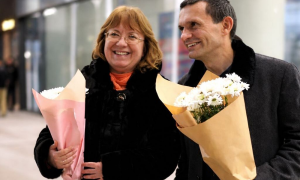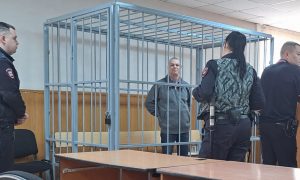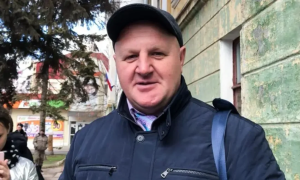Secret police officers hold “conversations” with and warn individuals suspected of talking to others of their faith, official reports from Almaty Region confirm. Talking about religion without state registration is illegal and punishable. Officials refuse to say why this is a state security issue.
Individuals who talk about their religious views with others without state permission – an “offence” in Kazakhstan – are often fined and sometimes imprisoned. Those who do not go on to be punished can face “conversations” with officers of the National Security Committee (KNB) secret police and verbal or written warnings from them, according to official reports.
Other state agencies tasked with punishing or warning those who talk about their faith with others are the Police, the Prosecutor’s Office and Regional Religious Affairs Departments.
Although legal restrictions already ban and punish free speech on religion, the Minister who oversees religion has announced that further restrictions will be imposed in amendments to the Religion Law and other Laws likely to reach Parliament in September (see below).
While punishments for speaking to others about one’s faith are frequent, two Jehovah’s Witnesses have gained small victories in court. Both are foreign citizens legally living and working in Kazakhstan who were fined and ordered deported for speaking within their own communities. In separate cases, the Supreme Court and a Regional Court have overturned the punishments at the request of prosecutors. The courts agreed with prosecutors that speaking within one’s own religious community does not constitute “missionary activity” (see below).
No explanations
An official of the government’s Religious Affairs Committee in the capital Astana, who did not give his name, refused absolutely to explain to Forum 18 on 11 August why the government regards talking about one’s faith with others as a state security issue. He also refused to say if the Committee had issued guidance to officials of Regional Religious Affairs Departments that participation by foreigners in the life of a religious community does not constitute “illegal missionary activity”.
“Only Committee Chair Galym Shoikin is authorised to speak to the media,” the Legal Department official told Forum 18. However, Shoikin’s phone went unanswered each time Forum 18 called on 11 and 12 August.
The telephone also went unanswered of Marat Azilkhanov, who oversees the Religious Affairs Committee in his role as a Deputy Culture and Sport Minister. Azilkhanov worked for the KNB secret police from 1992 until 2011, when he was appointed to the then Religious Affairs Agency.
The Press Office at the KNB secret police in Astana went unanswered each time Forum 18 called on 11 and 12 August.
Punishments for free speech on religion
All people who discuss religious issues with others are required to have permission from a registered religious organisation and have a permit from the state Regional Religious Affairs Department. Any literature they use when they speak to others also needs to be censored in advance by the Religious Affairs Department. Anyone who speaks on religion to others without such permission faces punishment under Administrative Code Article 490, Part 3.
Administrative Code Article 490, Part 3 punishes: “Carrying out missionary activity without state registration (or re-registration), as well as the use by missionaries of religious literature, information materials with religious content or religious items without a positive assessment from a religious studies expert analysis, and spreading the teachings of a religious group which is not registered in Kazakhstan”. The punishment is a fine of 100 Monthly Financial Indicators (MFIs), with deportation if the individual is a foreign citizen.
A fine of 100 MFIs is currently 212,100 Tenge (5,000 Norwegian Kroner, 550 Euros or 610 US Dollars). This is more than six weeks’ average wages for those in work, according to July 2016 average income figures from the government’s Statistics Committee. However, some of those fined are unemployed or pensioners on lower incomes.
Prosecutions are frequent. Ten individuals are known to have been punished under Article 490, Part 3 in the first six months of 2016 (see F18News 15 July 2016 http://www.forum18.org/archive.php?article_id=2199).
If individuals talking about religion are believed to be from an organisation banned as “extremist” – such as the Tabligh Jamaat Muslim missionary movement – they face criminal prosecution. Murat Takaumov was given a nine-month prison term on 2 June in Astana, making him the 31st alleged member of Tabligh Jamaat to be convicted since December 2014 of promoting Islam as a member of the movement. Of these, 19 received prison terms. Five more alleged members are under criminal investigation in Oskemen (see F18News 8 June 2016 http://www.forum18.org/archive.php?article_id=2186).
If the authorities interpret individuals’ comments about religion as making negative comparisons with other faiths, they can face criminal prosecution under the broadly-framed Criminal Code Article 174, Part 1. This punishes “incitement of social, national, clan, racial, or religious hatred or antagonism”. Seventh-day Adventist Yklas Kabduakasov, as well as two of the 31 Muslims imprisoned as alleged Tabligh Jamaat members, are serving prison sentences under this Article. All rejected the accusations (see F18News 22 July 2016 http://www.forum18.org/archive.php?article_id=2201).
All 32 investigations which led to these criminal convictions were initiated by the KNB secret police. The KNB in Astana sent a “senior operational officer” masquerading as a Tabligh Jamaat adherent to infiltrate groups of Muslims. His evidence was used in the prosecution cases of Astana Muslims. The officer refused to talk to Forum 18 in April (see F18News 22 April 2016http://www.forum18.org/archive.php?article_id=2170).
Harsher punishments to come?
Amendments to the Religion Law and a series of other laws are being prepared to restrict even further the exercise of freedom of religion or belief. This is in response to a 10 June order by President Nursultan Nazarbayev to harshen laws on “extremism”, terrorism and religion. The proposed amendments are likely to reach Parliament in September.
At a 19 July meeting of government ministers and senior officials, Culture and Sport Minister Arystanbek Mukhamediuli (who oversees the government’s Religious Affairs Committee) said that, among other things, “missionary activity” will be subjected to controls. “Activity to spread a faith as a missionary without registration will not be allowed,” he declared. As talking to others on religion is already banned unless it has been specifically authorised by the state, it remains unclear what further controls might be introduced (see F18News 22 July 2016 http://www.forum18.org/archive.php?article_id=2201).
Almaty Region KNB warns those speaking to others of their faith
A series of reports from official agencies of Almaty Region reveal that the KNB secret police track and warn individuals involved in talking to others of their faith, even if such individuals do not face prosecution.
A 20 July report covering police work in Almaty Region in the first half of 2016 notes: “Two instances of illegal missionary activity on the part of six people of religious orientation were thwarted, and officials of the Regional KNB conducted legal explanations with them and issued a warning.” Countering “missionary” activity was listed as part of the “struggle with extremism”.
The report added that as of 1 July, 193 individuals were subject to monitoring by the Anti-Extremism Directorate of the Police. It did not explain whether they were being monitored for talking to others about their faith or for other reasons.
A similar approach to eliminating sharing one’s faith with others came in the Almaty Regional Police’s criminological report for 2015, issued on 27 January 2016. “Ten instances of illegal missionary activity on the part of 45 adherents of the religious extremist Tabligh Jamaat organisation were thwarted,” it noted in the section on the “struggle with extremism”.
The report for the first nine months of 2015 by the Regional Religious Affairs Department, issued on 28 December 2015, notes: “According to information from the Police Department for the Struggle with Extremism, illegal missionary activity by the religious extremist organisation Tabligh Jamaat was uncovered in Almaty Region.” It added that “eight methods” it had of sharing faith by 36 of its adherents were thwarted in five Districts and two cities of Almaty Region. “Legal explanatory conversations were held with them by officers of the law-enforcement agencies, Prosecutor’s Office and the Regional KNB.”
No explanation of secret police involvement
Baurzhan Niet, chief specialist at Almaty Region Religious Affairs Department, repeatedly refused to explain why the authorities regard sharing faith as a matter for the KNB secret police or the Police Department for the Struggle with Extremism. He also refused to explain at whose initiative these agencies become involved. “This is secret information,” he told Forum 18 from the regional capital Taldykorgan on 11 August.
When Forum 18 read to him the official reports detailing the KNB secret police involvement in talking to and, on occasion, warning those involved in sharing their faith, Niet responded: “We don’t give out this information as you are not an official institution.”
Reached the same day, an officer of Almaty Region KNB secret police – who would not give his name – initially denied that his fellow officers were involved in countering sharing of faith. “This is an issue not for the KNB but for the Religious Affairs Department,” the officer insisted to Forum 18 from Taldykorgan on 11 August.
When Forum 18 read to him the official reports detailing the KNB secret police involvement, the officer responded: “The law doesn’t allow us to give any explanations by phone. No similar state body in any state gives such information. Come and visit us in person.”
Deportation of foreign citizens
In recent years a number of foreign citizens legally living and working in Kazakhstan have been punished under Administrative Code Article 490, Part 3 (or its predecessor in the earlier Administrative Code which was replaced in January 2015). They were fined and ordered deported.
Baptist pastor Viktor Lim was fined and ordered deported in May 2013 for leading a registered religious community. Lim, a stateless person, had lived in the country for 20 years and his wife and children are Kazakh citizens. Polish cardiologist Robert Panczykowski had preached at a Jehovah’s Witness meeting in August 2013. Kyrgyz citizen and Jehovah’s Witness Shamurat Toktoraliyev discussed his faith in a private flat in September 2013.
Jehovah’s Witness Yuri Toporov, a Russian citizen married to a Kazakh citizen, was punished for addressing a meeting of his community in Almaty in November 2013. He failed to overturn the decision on appeal, despite a call by five United Nations Special Rapporteurs and an Independent Expert for him not to be deported (see F18News 8 October 2014http://www.forum18.org/archive.php?article_id=2004).
Three Turkish academics working at the Ahmet Yesevi University in Turkestan in South Kazakhstan Region were convicted of “illegal missionary activity” in June 2015 for teaching the Naqshbandi form of Islam in private lessons. They too were fined and ordered deported (see F18News 17 July 2015 http://www.forum18.org/archive.php?article_id=2082).
Fines and deportations overturned on appeal
In two recent Jehovah’s Witness cases, higher courts have overturned fines and deportation orders handed down on foreign citizens legally resident in Kazakhstan who were punished for alleged “missionary activity” for speaking within their own communities.
Maksim Sulyargin – who is from another former Soviet republic – was prosecuted under Administrative Code Article 490, Part 3 for addressing his own Jehovah’s Witness community in Astana on 8 August 2015. On 16 September, Judge Kanat Imanaliyev of Astana’s Specialised Inter-District Administrative Court fined him 100 MFIs and ordered his deportation within five days of the decision entering legal force. The decision, seen by Forum 18, describes this as a “reasonable time”.
On 15 October 2015, Astana City Court rejected Sulyargin’s appeal. However, he lodged a cassational appeal to the same Court, backed by the Prosecutor, arguing that he had been speaking to his own religious community and therefore had not been trying to attract new adherents to his faith. He said he had thus not been conducting “missionary activity”. On 5 November 2015, a panel of three Judges chaired by Kenzhe Aktailakov upheld his appeal entirely, according to the decision seen by Forum 18. The Judges dismissed the case against him “for the absence in his actions of the elements of an offence”.
Sulyargin had not been obliged to leave Kazakhstan at the time of the cassational appeal as the court decision ordering his deportation had not entered into legal force.
Similarly, Polish cardiologist Panczykowski finally overturned at the Supreme Court his 2013 fine of 100 MFIs and deportation order. On 16 June 2016, a panel of three Judges chaired by Aigul Kydyrbayeva annulled the original November 2013 conviction and December 2013 appeal decision, which had upheld the conviction (see F18News 23 January 2014http://www.forum18.org/archive.php?article_id=1919).
The Supreme Court decision, seen by Forum 18, dismissed the case against Panczykowski “for the absence in his actions of the elements of an administrative offence”.
The decision notes that the latest hearing in the case had come at the initiative of the General Prosecutor’s Office. It considered that “given the smooth conducting of religious rites and meetings in places of worship and in the absence of violations of the rights and interests of people living nearby”, Panczykowski’s actions could not be regarded as “missionary activity” and therefore no “offence” had been committed.
The Court noted that although people who were not members of a particular faith could voluntarily enter such a place of worship and might be present at such a worship service, the prime objective of such a service was to meet the religious needs of those who already belong to the faith.
Panczykowski had left Kazakhstan soon after his first appeal was rejected. However, he had not paid the fine. The Court Bailiff had blocked his bank account, but had not taken the funds. “These funds up till now have remained frozen,” Jehovah’s Witnesses told Forum 18 from Almaty on 26 July. A request was sent to the Court Bailiff to unfreeze these funds. “At present we are waiting for a response from them.”
Jehovah’s Witnesses note that “in theory” Panczykowski could return to Kazakhstan, given the cancellation of the punishment, including the deportation order. They have asked the Migration Service to remove him from the entry blacklist.
Jehovah’s Witness Toporov is also seeking to have his fine and deportation order overturned. He too appealed to the General Prosecutor’s Office. “We hope too that his case will be positively reviewed soon within the country before his appeal to the United Nations Human Rights Committee is considered,” Jehovah’s Witnesses told Forum 18.
Toporov complained to the UN Human Rights Committee in October 2014. He is among about 50 Jehovah’s Witnesses to have lodged such complaints to the Committee about punishments for talking about their faith with others. The Kazakhstan government responded to the Committee on 30 January 2015, claiming that such punishments were “justified”. The Committee has not yet issued decisions on these cases (see F18News 13 May 2016 http://www.forum18.org/archive.php?article_id=2177).
Will foreign legal residents feel safe in own religious communities?
Despite the two court decisions in November 2015 and June 2016 upholding the right of foreign citizens legally resident in Kazakhstan to play a full part in their own religious communities without fear of fines and deportation orders for conducting “illegal missionary activity”, it remains unclear if such state harassment will stop.
When police raided New Life Church in the Caspian Sea port of Aktau on 30 January 2016, as it met for worship in a rented cafe, officers were particularly interested in foreign citizens who were present. The Regional Religious Affairs Department had failed to respond to the Church’s request for two invited pastors from Azerbaijan to be granted permission to speak as “missionaries”. Officers subjected an Indian citizen legally working locally to psychological pressure for attending as a church member.
The raid was led by the head of the police Department for the Struggle against Extremism, Separatism and Terrorism (see F18News 8 February 2016 http://www.forum18.org/archive.php?article_id=2147). (END)
http://www.forum18.org/archive.php?article_id=2207





